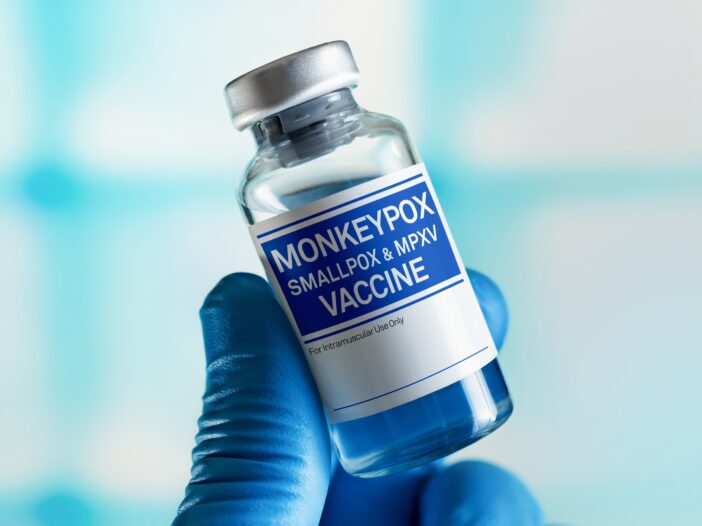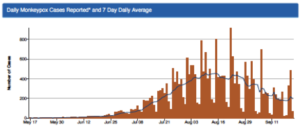
 MPV cases continue a slow decline, but now is no time for complacency: As of September 23, 24,826 people had been diagnosed with MPV in the U.S. The national decline is mirrored in data from several states and cities, including Florida and Georgia. Over the last week, the weekly number of new diagnoses appears to have stabilized, underscoring the need to avoid complacency. The level of new diagnoses remains too high. New CDC data showing a marked increase in STDs in 2021 – including the biggest increase in syphilis cases in more than seven decades – highlights the need for continued vigilance and focused efforts to prevent MPV transmission.
MPV cases continue a slow decline, but now is no time for complacency: As of September 23, 24,826 people had been diagnosed with MPV in the U.S. The national decline is mirrored in data from several states and cities, including Florida and Georgia. Over the last week, the weekly number of new diagnoses appears to have stabilized, underscoring the need to avoid complacency. The level of new diagnoses remains too high. New CDC data showing a marked increase in STDs in 2021 – including the biggest increase in syphilis cases in more than seven decades – highlights the need for continued vigilance and focused efforts to prevent MPV transmission.- The decline in new MPV diagnoses has increased the optimism of federal health officials: Demetre Daskalakis, deputy coordinator of the Biden Administration’s MPV response team, said he was optimistic that MPV could be eliminated in the U.S. One of the sources of optimism is the improvement in vaccine supplies in recent weeks. Daskalakis noted, though, that the U.S. will never be fully protected from MPV unless the disease is eliminated worldwide. During NMAC’s interview last week with Greg Millett, amfAR’s Vice President and Director of Public Policy, he noted that the recent MPV outbreak outside west and central Africa is a direct result of the failure of health efforts to respond effectively to evidence of the increasing frequency and severity of MPV outbreaks in recent years in Africa.
- Optimism is welcome, but there is a catch! Racial and ethnic disparities in MPV risk and service access persist: With other communicable diseases, including HIV, marked progress in reducing new infections hasn’t always extended beyond white populations. Instead, we’ve watched as diseases that were largely eliminated in white communities became endemic in communities of color. In Michigan, Black people account for 14% of the state’s population but for 56% of Michigan’s MPV diagnoses. In Pittsburgh, Black men comprise 38% of MPV diagnoses but only 12% of people who have been vaccinated. If we hope to realize the goal of eliminating MPV, we’ll need to make increasing the access of communities of color to MPV information, testing, treatment and prevention the first priority.
- Dallas Black Pride cancelled: Continued high levels of MPV transmission persuaded Southern Pride to cancel the annual Black Pride weekend held every year at the end of October.
- Racism and MPV: Dallas health officials pulled a flyer advertising an MPV vaccine pop-up clinic after complaints that the only person depicted on the flyer was the cartoon face of a Black man. The very name “monkeypox” is the focus of increasing criticism, in part due to stigmatizing racial connotations. The name is misguided for multiple reasons – while MPV was first isolated in monkeys, giving rise to the name, rodents, not monkeys, are the primary carriers of the virus, according to medical experts at Johns Hopkins University. The World Health Organization has invited the public to help it find a new, more accurate and less stigmatizing name for the disease.
- Homophobia and MPV: The communities most affected by MPV are fortunate that one of the Biden Administration’s leaders of the MPV response is Demtre Daskalakis, an out gay doctor who has devoted his life to advancing the health and well-being of LGBTQI+ people. But right-wing Internet trolls have other ideas, it seems. Media outlets have reported on a surge in online attacks on Daskalakis, taking issue with his shirtless online photos and his body art. Daskalakis has laughed off the attacks while continuing to do his job.
- Call an Uber to fight MPV: Every serious epidemic, from HIV to COVID-19, has prompted out-of-the-box thinking on strategies to help people get the information and services they need. The same is true for MPV. In California, Uber is partnering with Equality California to provide free rides to people who want to get vaccinated for MPV.